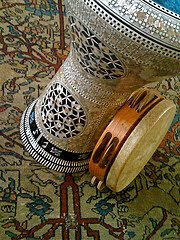 Before shopping for a drum, familiarize yourself with some basic characteristics and form an idea about what you want.
Before shopping for a drum, familiarize yourself with some basic characteristics and form an idea about what you want.
Skin (or "head")
- Natural (goat or fish) - warm sound and feel; performs best in dry climates
- Synthetic (plastic) skin - brighter sound; a great option for Hawaii because the humidity doesn't affect it.
- Fixed - no integrated mechanism for changing the tuning. Replacing broken skins difficult/expensive.
- Natural - warm on a heating pad every few minutes in humid climates to keep in tune.
- Synthetic - we've heard a (heat gun? oven?) can be used to permanently change the tuning.
- Tunable - designed to allow you to change the pitch. Skin replacement relatively easy.
- External - Lugs or rope/cording on the outside - not recommended.
- Internal - recommended.
- Typically, the smaller the playing surface, the higher the pitch.
- Consider size & weight - particularly if you expect to take it backpacking or on planes.
- Body - Goblet shape (photo)
- Ceramic - Crisp yet warm sound; fixed tuning; breakage worries. For one like Tara's, look for a Daveed Doumbek - These are no longer in production, so they become increasingly difficult to get.
- Metal - Snappier or tinnier sound; tunable; durable. The thicker cast aluminum or copper drums tend to have internal tuning; thinner, brass/nickel bodies tend to have external tuning.
- Wood - Meinl makes inexpensive ones with fixed, natural skins. Canadian company Sylvan Temple Drums makes pricier ones to order with a tunable fish or synthetic skin (photo), or a with wooden "skin" (photo).
- Fiberglass - lighter weight, durable. Can have a "plastic-y" sound. Good for backpacking & travel.
- Rims
- Egyptian style rounded rim, good for rapid finger rolls
- Turkish style angled rim, good for rapid finger snapping techniques (not taught in this class)
- Size - Some size have different names. See a comparison video here.
- Mini/children's/finger - Recommended for kids, but not for beginning adults
- Doumbek - standard
- Sombati - medium large (such as Tara's inlaid drum)
- Doholla - large
- Recommendation: Cast aluminum or copper doumbek with the Egyptian style (rounded) rim, internal tuning, and synthetic skin. For a pro-quality instrument like Tara's inlaid drum, she recommends the Souhail Kaspar Signature Drum (sombati size). If you buy a new drum, consider getting a spare skin at the same time.
- Body - depth of the shell is less than the diameter of the playing surface
- Diameter - Larger for deeper sound, smaller for higher pitch
- Shell thickness - Thicker for more resonant sound
- Shell depth - Deeper shells may have a cutout or a thumb hole to facilitate holding
- Extras
- Recommendation: Cooperman tar or bendir, internal tuning, synthetic head, 16-18" diameter, with cut-out for hand(s)
Online Retailers
When searching for a drum online, try alternate spellings and names, because sometimes people don't accurately name the drum they're selling, or they use a very specific a name.
When you buy a drum online, ask clarifying questions of the seller about the condition of the drum and skin, ask about accessories (tuning key, case, shoulder strap, replacement skin). Request more detailed photos if needed.
Specify your preferred shipping method; While relatively inexpensive, "surface" shipping to Hawaii can take 4-6 weeks.
We have had positive experiences with:
- Cooperman (high quality frame drums, custom orders possible)
- Mid-East Manufacturing for doumbeks or frame drums
- Touch the Earth for doumbeks
- Musician's Friend for frame drums or doumbeks
- Souhail Kaspar Signature Drums (doumbeks)
Check Craigslist, too.
Local Vendors
In local stores (Harry's; Easy Music, etc.) look for these brands:
- Meinl - Good reputation.
- Remo - Durable. Try the Ergo
So you want to buy a drum... An 11-page article by Jon Gilchrist.
Happy shopping!

No comments:
Post a Comment